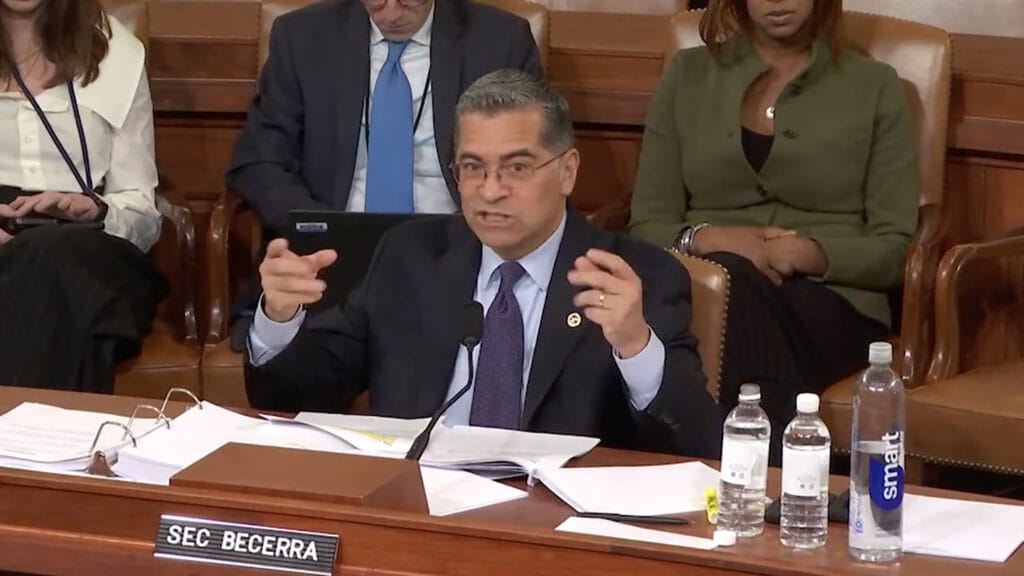

For the second time in a week, Health and Human Services Secretary Xavier Becerra faced a grilling on Capitol Hill over federal regulators’ plans to impose a nurse staffing minimum on all US nursing homes.
Becerra testified Wednesday before the House Ways and Means Committee, which in late February agreed to advance legislation designed to block the Centers for Medicare & Medicaid Services from imposing such a rule. As with that vote, the reception of Becerra and his defense of the proposed standards split along party lines.
Chairman Jason Smith (R-MO) opened the hearing by saying he had “serious concerns” about administration policies and 2025 budget initiatives that “prioritize politics over the health of the American people and will harm access to quality, affordable healthcare.”
Among the policies he rallied against first was the staffing standard, first proposed in September and now awaiting final review at the White House Office of Management and Budget. CMS leaders have said they will finalize the rule this year.
“Estimates show this rule will impose a $4.6 billion cost on nursing homes, 94% of which currently wouldn’t be in compliance, jeopardizing access to care for 1.2 million Americans,” Smith said. “Can you commit … that no nursing homes will close and patients won’t lose access to care as a result of this rule?”
Becerra hedged, saying that patients would still be able to find a nursing home that offers them “quality care.”
“We want to make sure that no nursing home becomes a death sentence for any American who has to use a facility, and we want to work with every nursing hom to make sure they are offering quality services,” he said.
Pandemic pressures
Becerra based his justification for the rule on the pandemic, and the fact that one in every five COVID deaths occurred in nursing homes, a point later undermined by Rep. Brad Wenstrup (R-OH), who pointed to admissions requirements for allowing COVID to spread through nursing homes.
Becerra throughout the four-hour hearing defended the agency’s plan to implement hourly requirements for registered nurses and certified nurse aides, as well as a provision requiring an RN around the clock in every nursing home, regardless of patient need.
“Something’s going on and we can’t just close our eyes to it,” Becerra said. “We have to make sure that if we’re going to leave our loved ones in a nursing home, there is a nurse that’s available to provide care.”
But given an opening by Ranking Member Richard Neal (D-MA) to outline attempts to bolster the long-term care workforce, Becerra only offered general statements about ensuring caregivers earn more than “burger flippers” and drew attention to efforts to better support the behavioral health workforce.
Pay for mandate or pause it?
The proposed skilled nursing staffing mandate called for $75 million to support educational and workforce initiatives to help the sector recruit and retain more nursing staff. But details on how that money might be distributed have not been announced.
In a separate hearing last week, Senators asked how CMS would ensure that money would get to communities that struggle to meet the mandate.
In the House, Rep. Linda Sanchez (D-CA) defended the rule as “long overdue and necessary,” citing its exemptions for rural and other providers who struggle to hire. “Unlike what has been said, it’s not one-size fits all,” she said.
Still, Rep Greg Murphy (R-NC), a urologist and former medical center director, asked Becerra to pause implementation given still-rampant shortages in the healthcare workforce. He tried to cut through administration rhetoric that has laid blame for much of nursing homes’ challenges at the feet of private investors.
“That’s not the reason we can’t put nurses in nursing homes. We don’t have the nurses,” he said. “I’m fine if we work on some program to get nursing homes up to par. I believe it’s absolutely necessary. But you can’t make them [nurses] out of thin air.”




